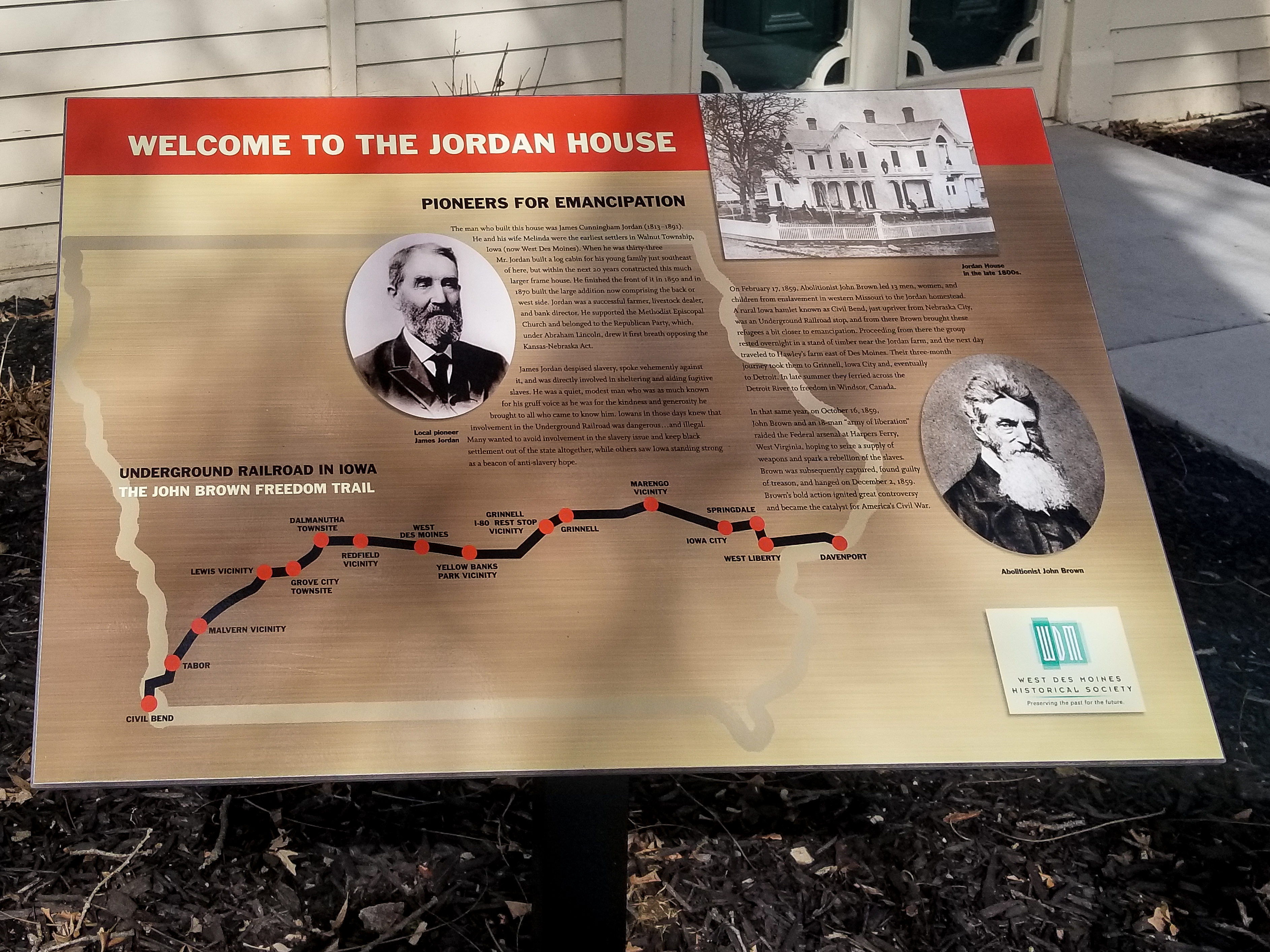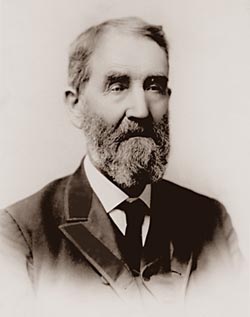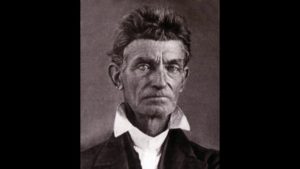
Meet Iowa Farmer James Jordan, Underground Railroad Conductor
Some call them upstanders. Others call them allies. These courageous people are the ones who stand up to help those being oppressed, even at the risk of their own safety. In frontier Iowa, James Jordan fearlessly helped Freedom Seekers gain safe passage on the Underground Railroad route that passed near his farm in the area that would become West Des Moines.
The Underground Railroad ran across the southern and central regions of Iowa, a state where slave ownership was never legal. This impacted pioneer farmer J Jordan (1813-1891) and his wife, Melinda, some of the earliest settlers in Polk County’s Walnut Township. The land they once owned includes the stately Jordan House, which is located along Fuller Road in West Des Moines. The Jordan’s farm harbored fugitive slaves during the tense days leading up to America’s Civil War. Such daring deeds, however, weren’t always part of the Jordan family’s history.
Jordan was born in in 1813 in what is now West Virginia, in a community where slavery was ingrained in society and culture. Jordan, a cattle farmer, was expected to assist family members and neighbors in their hunt for escaped slaves. Jordan’s branch of the family, however, was influenced by a religious movement called “The Great Awakening” that was sweeping the country and opposed slavery. These experiences developed Jordan’s abolitionist beliefs and zeal, especially as he moved westward.

Jordan House, West Des Moines
Building a new life in central Iowa
As treaties were signed between the U.S. government and the Indian tribes that agreed to move out of the Iowa territory by the mid-1840s, pioneers like Jordan were ready to move in. After Jordan settled in the Walnut Township area of Polk County, he chose a beautiful location with ancient oak, walnut and hickory trees on land gently sloping to the Raccoon River. Jordan’s first shelter was a lean-to tent, which he replaced in 1848 with a log cabin.
In 1850, Jordan and his wife, Melinda, began work on the first phase of a new frame house. The family, which at that time included six children, lived for a time in the basement, which included a small kitchen and a bedroom/sitting room.

James Jordan
Aiding the Meskwaki
Jordan became a successful farmer, livestock dealer and bank director. Though Jordan’s dream was to develop and manage a financially successful livestock business, he remained deeply committed to helping others achieve their dreams, as well. He supported the Methodist Episcopal Church and belonged to the new Republican Party, which included many members who opposed the Kansas-Nebraska Act that Congress passed in 1854.
The Kansas-Nebraska Act allowed people in the territories of Kansas and Nebraska to decide for themselves whether or not to allow slavery within their borders. The Act repealed the Missouri Compromise of 1820, which prohibited slavery north of latitude 36°30´. The Kansas-Nebraska Act infuriated many in the North, who considered the Missouri Compromise to be a long-standing, binding agreement. There was strong support for the Kansas-Nebraska Act, however, in the pro-slavery South.
Pro-slavery and anti-slavery supporters rushed in to settle Kansas and impact the outcome of the first election held there after the law went into effect. Violence soon erupted, with the anti-slavery forces led by the radical abolitionist John Brown. The territory earned the nickname “bleeding Kansas” as the death toll rose.
Back in Iowa, many citizens wanted to avoid involvement in the slavery issue and keep black settlement out of the state altogether, while others saw Iowa standing strong as a beacon of anti-slavery hope. When Jordan was elected to the Iowa Senate in the mid-1850s, he was able to make a difference Sen. Jordan and his colleagues in the Iowa State Legislature helped the Meskwaki Indians achieve their dream of regaining the land they had lost in Iowa.
Speaking out against slavery
While Jordan was described as a quiet, modest man who was widely-known for the kindness and generosity he showed to all who came to know him, he despised slavery and spoke out vehemently against it. Jordan was actively engaged in the abolitionist movement locally, becoming the “chief conductor” of the Underground Railroad in Polk County. Jordan knew that involvement in the Underground Railroad was dangerous and illegal. Nevertheless, he became directly involved in sheltering and aiding fugitive slaves from his Walnut Township farm.
At the state level, Jordan promoted the anti-slavery Republican Party, and on the national level he befriended the radical abolitionist John Brown. Brown stayed at the Jordan House at least twice, the last time in 1859 when he was leading a group of 12 slaves he had recently liberated in Missouri to freedom in Canada.
On February 17, 1859, Brown led 13 men, women and children who had been enslaved in western Missouri to the Jordan homestead. The small group had begun their journey at a rural Iowa hamlet known as Civil Bend, an Underground Railroad stop just upriver from Nebraska City, Nebraska. From there, Brown brought the refugees a bit closer to emancipation. As they neared central Iowa, the group rested in a stand of timber near the Jordan farm.
(While people on the Underground Railroad stopped at the Jordan family’s property, they most likely never set foot in the actual home. Jordan was one of the largest land owners in the state, plus there were barns and outbuildings on his property, so it didn’t make much sense for freedom seekers to hide in the basement of the Jordan family’s home, according to the West Des Moines Historical Society in a 2018 interview with Des Moines TV station WHO Channel 13.)
After leaving the Jordan farm, the group of freedom seekers traveled the next day to a place called Hawley’s farm east of Des Moines. Their three-month journey took to them to Grinnell, Iowa City and eventually to Detroit, Michigan. In the late summer of 1859, the group ferried across the Detroit River to freedom in Windsor, Canada.

John Brown
Just a few months later, on October 16, 1859, John Brown and an 18-man “army of liberation” raided the federal arsenal at Harpers Ferry, West Virginia, hoping to seize a supply of weapons and spark a rebellion of slaves. Brown was subsequently captured, found guilty of treason, and hanged on December 2, 1859.
It’s interesting to note that Brown’s connections to James Jordan weren’t his only ties to rural Iowa settlers. One line of the Underground Railroad crossed the Raccoon River in southern Dallas County. Fugitive slaves in the 1850s sometimes traveled this route to the “Quaker Divide” northeast of Dexter. Many local members of the Society of Friends (Quakers) supported anti-slavery efforts.
Some residents, like Harmon Cook, were conductors on the Underground Railroad. When Brown was in the Dexter-Redfield area before his 1859 raid on Harper’s Ferry, he admonished Cook after the conductor almost got caught going to Des Moines with fugitive slaves. “Young man, never do so rash a thing as to talk and laugh out loud on the way.”
While no one knows for sure how many slaves reached freedom on the Underground Railroad, historians estimate that 1,000 slaves per year made the attempt. Most who tried did not have the benefit of someone like John Brown or Harriet Tubman to guide them along the journey and were not successful.
Seeking the north star of freedom
Jordan’s role in the Underground Railroad has been honored for generations. “The History of Polk County,” published in 1880, stated that “Jordan has been a life-long enemy of slavery; his devotion to the political life as a staunch and stalwart Republican is the outgrowth of deep-seated conviction; it is among the pleasant things to remember, that under his protecting roof John Brown and his associates, with more than a score of recently liberated slaves, have offered their prayers and sung their first jubilee hymns on their way to Canada….”
Jordan passed away in 1891, but his story lives on. Today, the Jordan House, a stately Victorian home of Italianate Gothic design, is one of the oldest structures in Polk Country and is one of the few locations in Iowa where visitors can tour the home of an Underground Railroad conductor. The home is listed on the National Register of Historic Places and is part of the National Underground Railroad Network to Freedom Program.
Perhaps Jordan’s legacy was best summarized by Jordan’s pastor, who eulogized him by stating, “In the days of slavery this great heart reached out and helped the oppressed, seeking the north star of freedom.”
Click here to learn more if you’d like to plan a visit the Jordan House in West Des Moines.
Want more?
This story is an excerpt from my book Iowa Agriculture: A History of Farming, Family and Food. Click here to learn more and order a signed copy here.
I invite you to read more of my blog posts if you value intriguing Iowa stories and history, along with Iowa food, agriculture updates, recipes and tips to make you a better communicator.
If you’re hungry for more stories of Iowa history, check out my top-selling “Culinary History of Iowa: Sweet Corn, Pork Tenderloins, Maid-Rites and More” book from The History Press. Also take a look at my other books, including “Iowa Agriculture: A History of Farming, Family and Food” from The History Press, “Dallas County” and “Calhoun County” book from Arcadia Publishing. All are filled with vintage photos and compelling stories that showcase the history of small-town and rural Iowa. Click here to order your signed copies today! Iowa postcards are available in my online store, too.
If you like what you see and want to be notified when I post new stories, be sure to click on the “subscribe to blog updates/newsletter” button at the top of this page, or click here. Feel free to share this with friends and colleagues who might be interested, too.
Also, if you or someone you know could use my writing services (I’m not only Iowa’s storyteller, but a professionally-trained journalist with 20 years of experience), let’s talk. I work with businesses and organizations within Iowa and across the country to unleash the power of great storytelling to define their brand and connect with their audience through clear, compelling blog posts, articles, news releases, feature stories, newsletter articles, social media, video scripts, and photography. Learn more at www.darcymaulsby.com, or e-mail me at yettergirl@yahoo.com.
Let’s stay in touch. I’m at darcy@darcymaulsby.com, and yettergirl@yahoo.com.
Talk to you soon!
Darcy
Recent Posts
- Do Press Releases Still Work?
- Erasing History? Budget Cuts Threaten to Gut Ag History at Iowa State University
- Machines that Changed America: John Froelich Invents the First Tractor in Iowa
- Bob Feller on Farming, Baseball and Military Service
- Classic Restaurants of Des Moines: A Taste of Thailand Served the "Publics" and Politics
- Want to Combat Fake News? Become a Better Researcher
Categories
- Achitecture
- Agriculture
- Architecture
- baking
- barbeque
- Barn
- breakfast
- Business
- Communication Tips
- Conservation
- content
- cooking
- Crime
- Dallas County
- Economical
- Farm
- Featured
- Food
- Food history
- health
- Iowa
- Iowa food
- Iowa history
- marketing
- Photography
- Recipes
- Seasonal
- Small town
- Storytelling
- Uncategorized
- writing
Archive by year
- 2023
- 2022
- 2021
- 2020
- When Agriculture Entered the Long Depression in the Early 1920s
- The Corn Lady: Jessie Field Shambaugh and the Birth of 4-H in Iowa
- Sauce to Sanitizer: Cookies Food Products Bottles Hand Sanitizer Made with Ethanol
- Myth Busting: No, Your Pork Doesn't Come from China
- Long Live Print Newsletters! 5 Keys to Content Marketing Success
- Shattering Silence: Farmer Helped Slave Find Freedom and Racial Equality in Iowa
- Meet Iowa Farmer James Jordan, Underground Railroad Conductor
- George Washington Carver Rose from Slavery to Ag Scientist
- Remembering the African-American Sioux City Ghosts Fast-Pitch Softball Team
- Want to Combat Fake News? Become a Better Researcher
- Classic Restaurants of Des Moines: A Taste of Thailand Served the "Publics" and Politics
- 2019
- The Untold Story of Iowa’s Ag Drainage Systems
- Stop Rumors Before They Ruin Your Brand
- Finding Your Voice: The Story You Never Knew About "I Have a Dream"
- Warm Up with Homemade Macaroni and Cheese Soup
- Can a True Story Well Told Turn You into a Tom Brady Fan?
- Baking is for Sharing: Best Bread, Grandma Ruby’s Cookies and Other Iowa Favorites
- 4 Key Lessons from Bud Light’s Super Bowl Corn-troversy
- Could Your Story Change Someone’s Life?
- What To Do When the Travel Channel Calls
- Tex-Mex Sloppy Joes and the Magic of Maid-Rite in Iowa
- How Not to Invite Someone to Your Next Event--and 3 Solutions
- We Need FFA: Iowa Ag Secretary Mike Naig Reflects on His FFA Experiences
- From My Kitchen to Yours: Comfort Food, Conversation and Living History Farms
- Smart Marketing Lessons from an Uber Driver--Listen Up!
- Hog Trailers to Humidors: Two New Iowa Convenience Stores Reflect “Waspy’s Way”
- A Dirty Tip to Make Your Social Media Content More Shareable
- Are You on Team Cinnamon Roll?
- Senator Grassley on Farming: Any Society is Only Nine Meals Away From a Revolution
- Why We Should Never Stop Asking Why
- What’s the Scoop? Expanded Wells’ Ice Cream Parlor Offers a Taste of Iowa
- Independence, Iowa’s Connection to the Titanic and Carpathia
- Memories of Carroll County, Iowa, Century Farm Endure
- Iowa's “Peacemaker Pig” Floyd of Rosedale Helped Calm Racial Tensions
- 2018
- How to Cook a Perfect Prime Rib
- How Did We Get So Rude?
- Mmm, Mmm Good: Soup’s on at the Rockwell City Fire Department
- Quit Using “Stupid Language”
- In Praise of Ham and Bean Soup
- Recalling a Most Unconventional—and Life-Changing--FFA Journey
- Events Spark Stories That Help Backcountry Winery Grow in Iowa
- Sac County Barn Quilt Attracts National Attention
- Doing Good, Eating Good at Lytton Town Night
- Young Entrepreneur Grows a Healthy Business in Small-Town Iowa
- Digging Deeper: Volunteers Showcase Thomas Jefferson Gardens in Iowa
- How to Tell Your Community’s Story—with Style!
- DNA Helps Sailor Killed at Pearl Harbor Return to His Family
- It’s Time to Be 20 Again: Take a Road Trip on Historic Highway 20
- The Biggest Reason You Shouldn’t Slash Your Marketing Budget in Tough Times
- Are You Telling a Horror Story of Your Business?
- Pieced Together: Barn Quilt Documentary Features Iowa Stories
- Unwrapping Storytelling Tips from the Candy Bomber
- Barn Helped Inspire Master Craftsman to Create Dobson Pipe Organ Builders
- Butter Sculptures to Christmas Ornaments: Waterloo Boy Tractor Celebrates 100 Years
- Ag-Vocating Worldwide: Top 10 Tips for Sharing Ag’s Story with Consumers
- 2017
- Growing with Grow: Iowa 4-H Leader Guides 100-Year-Old 4-H Club for 50 Years
- High-Octane Achiever: Ethanol Fuels New Driver Tiffany Poen
- Shakespeare Club Maintains 123 Years of Good Taste in Small-Town Iowa
- Iowa’s Ice Queen: Entrepreneur Caroline Fischer’s Legacy Endures at Hotel Julien Dubuque
- Darcy's Bill of Assertive Rights: How to Communicate and Get What You Need
- Celebrating Pi Day in Iowa with Old-Fashioned Chicken Pot Pie
- Cooking with Iowa’s Radio Homemakers
- Top 10 Tips to Find the Right Writer to Tell Your Company’s Stories
- The “No BS” Way to Protect Yourself from Rude, Obnoxious People
- Learning from the Land: 9 Surprising Ways Farmers Make Conservation a Priority
- Leftover Ham? Make This Amazing Crustless Spinach and Ham Quiche
- Iowa’s Lost History from the Titanic
- Coming Soon--"Dallas County," a New Iowa History Book!
- How to Clean a Burned Pan in 6 Simple Steps
- Iowa Beef Booster: Larry Irwin Takes a New Twist on Burgers
- Get Your Grill On: How to Build a Better Burger
- "Thank God It’s Over:" Iowa Veteran Recalls the Final Days of World War 2
- How to Thank Veterans for Their Military Service
- Imagine That! Writers, Put Your Reader Right in the Action
- Remembering Ambassador Branstad’s Legacy from the 1980s Farm Crisis in Iowa
- Busting the Iowa Butter Gang
- Lightner on Leadership: “Everyone Has Something to Give”
- Show Up, Speak Up, Don’t Give Up
- Small - Town Iowa Polo Teams Thrilled Depression - Era Crowd
- Ethanol:Passion by the Gallon
- Cruising Through Forgotten Iowa History on Lincoln Highway
- Why I'm Using a Powerful 500-Year-Old Technology to Make History--And You Can, Too
- 5 Ways a “History Head” Mindset Helps You Think Big
- Behind the Scene at Iowa's Own Market to Market
- Let’s Have an Iowa Potluck with a Side of History!
- Iconic State Fair Architecture: Historic Buildings Reflect Decades of Memories
- Iconic State Fair Architecture- Historic Buildings Reflect Decades of Memories
- Iowa Underground - How Coal Mining Fueled Dallas County's Growth
- Ultra-Local Eating: Jennifer Miller Guides CSA, Iowa Food Cooperative
- The Hotel Pattee and I are Hosting a Party—And You’re Invited!
- Tell Your Story—But How?
- Mediterranean Delights: Iowa Ag Influences Syrian-Lebanese Church Dinner
- 6 Steps for More Effective and Less Confrontational Conversations
- 6 Steps for More Effective and Less Confrontational Conversations!
- 6 Ways to Motivate Yourself to Write—Even When You’re Not in the Mood
- Always Alert-How to Stay Safe in Any Situation
- Does Accuracy Even Matter Anymore?
- Soy Power Shines at Historic Rainbow Bridge
- Free Gifts! (Let’s Talk Listening, Stories and History)
- 2016
- How to Connect with Anyone: Lessons from a Tornado
- Soul Food: Lenten Luncheons Carry on 45-Year Iowa Tradition
- Top 3 Tips for Writing a Must-Read Article
- Darcy's Top 10 Tips to Better Writing
- Top 8 Tips for Building a Successful Freelance Business
- 10 Steps to Better Photos
- Reinventing the Marketer of 2010
- Extreme Writing Makeover
- My Top Social Media Tips for Farmers: REVEALED!
- Honoring the Legacy of Rural Iowa's Greatest Generation
- Iowa's Orphan Train Heritage
- Dedham’s Famous Bologna Turns 100: Kitt Family Offers a Taste of Iowa History
- Iowa Barn Honors Pioneer Stock Farm
- Darcy's Top 10 Tips for Better Photos
- Soup and Small-Town Iowa Spirit
- Savoring the Memories: Van's Café Served Up Comfort Food for Six Decades
- Mayday, Mayday—The Lost History of May Poles and May Baskets in Iowa
- Iowa's Vigilante Crime Fighters of the 1920s and 1930s
- Very Veggie: Iowan's Farm-Fresh Recipes Offer Guilt-Free Eating
- Iowa Public TV's "Market to Market" Features Expedition Yetter, Agri-Tourism, Des Moines Water Works' Lawsuit
- 62 Years and Counting: Calhoun County, Iowa, Families Maintain 4th of July Picnic Tradition
- “A Culinary History of Iowa” Satisfies: Iowa History Journal Book Review
- For the Love of Baking: Lake City's Ellis Family Showcases Favorite Iowa Farm Recipes (Caramel Rolls, Pumpkin Bars and More!)
- Remembering Sept. 11: Iowa Community’s Potluck Honors America
- Talking Iowa Food and Culinary History on Iowa Public Radio
- Talking "Stilettos in the Cornfield," Taxes, Trade and More on CNBC
- FarmHer #RootedinAg Spotlight--FFA Attracts More Women to Careers in Ag
- Rustic Cooking Refined: Iowan Robin Qualy Embraces Global Flavors
- Voice of Reason: Iowa Pork Producer Dave Struthers Offers Top 10 Tips to Speak Up for Ag
- Iowa Eats! Why Radio Iowa, Newspapers and Libraries are Hungry for "A Culinary History of Iowa"
- Iowa Turkeys Carry on National Thanksgiving Tradition
- Riding with Harry: 2016 Presidential Election Reflects Truman's Iowa Revival at 1948 Plowing Match in Dexter
- All Aboard! Rockwell City’s “Depot People” Offer a Taste of Iowa History
- Is This Iowa's Favorite Appetizer?
- O, Christmas Tree! Small Iowa Towns Celebrate with Trees in the Middle of the Street
- Slaves Escaped Through Dallas County on Iowa’s Underground Railroad
- Adel Barn Accents Penoach Winery in Iowa
- Celebrating New Year's Eve in Style at a Classic Iowa Ballroom
